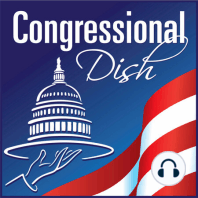9 min listen
CD080: The July Laws
ratings:
Length:
38 minutes
Released:
Oct 11, 2014
Format:
Podcast episode
Description
This episode examines three bills that passed Congress in July and have since become law. The first new law will give veterans quicker access to health care. The second new law is designed to provide job training to poor people, but a hidden provision will likely take us one step closer to 1984. The third new law is another glaring example of this Congress failing to do its job. Also, Jen tells you her plans for Congressional Dish's future. July Bills that Became Law H.R. 3230 Veterans Access, Choice, and Accountability Act of 2014 Allows veterans to get medical care outside the Veteran's Administration system; they can go to any health facility that serves Medicare patients, health centers, the Defense Department, and the Indian Health Service. Veterans are only given this option if they'd have to wait over 30 days for an appointment with the Veteran's Administration or if they live 40 miles or further from a Veteran's Administration clinic. If eligible, the veteran will receive a special identification card. How it works: Veteran notifies VA, VA puts Veteran on an electronic waiting list or authorizes their request, VA works out a payment agreement with the health care provider, VA reimburses health care provider but no more than they would for Medicare services. If the veteran gets treated for a problem that was not related to their military service, their health insurance plan will be responsible for payment and the health care provider will be responsible for going after the insurance company for the money. Veterans can not be charged higher co-payments for care at private facilities than they would have been charged at the Veteran's Administration. This program will end in three years. Orders a private-sector review, establishes a fifteen person commission, and creates a technology task force to review VA practices. Wait times for care can not be considered when determining performance bonuses for top officials at the Veteran's administration and performance goals that disincentivize using private health providers for veteran care will be eliminated. Wait times for health care at the VA, VA facility quality measures, and VA doctor credentials will be published online. The VA will add 1,500 graduate medical education residency positions for five years to address staffing shortages. Extends the program that reimburses medical students for education costs and increases the amounts they'll receive for working for the VA. Expands coverage for mental health care related to sexual assaults, which will include veterans on inactive duty. This will be effective August 7, 2015. Extends a pilot program for assisted living care for veterans with traumatic brain injuries until October 2017. Disqualifies public colleges that charge veterans more than State residents from being qualified schools for veteran education benefits. Makes it easier to fire or transfer senior executives at the Department of Veteran's Affairs. Appropriates $15 billion to implement these changes. The bill passed the Senate on July 31st by a vote of 91-3. The bill passed the House of Representatives on July 30 by a vote of 420-5. Rep. Walter Jones of North Carolina's statement H.R. 803 Workforce Innovation and Opportunity Act This bill was originally passed on March 15, 2013 as the SKILLS Act and was discussed in episode CD018: The Ryan Budget. The bill that became law was drastically different. Job Training Programs Keeps the make up of the boards largely the same: Most members will be representatives of the business community, twenty percent of the members must be State officials, and labor will be represented. The Chairmen will be from the business community. The State boards will advise local boards that will determine how funds are best spent in their local communities. States will be allowed to keep their current government-controlled boards, if they had established them before this bill became law. The goal is to co
Released:
Oct 11, 2014
Format:
Podcast episode
Titles in the series (100)
Intro to Congressional Dish: Hello! This is Congressional Dish. Listen to this to find out what this podcast is all about. by Congressional Dish
